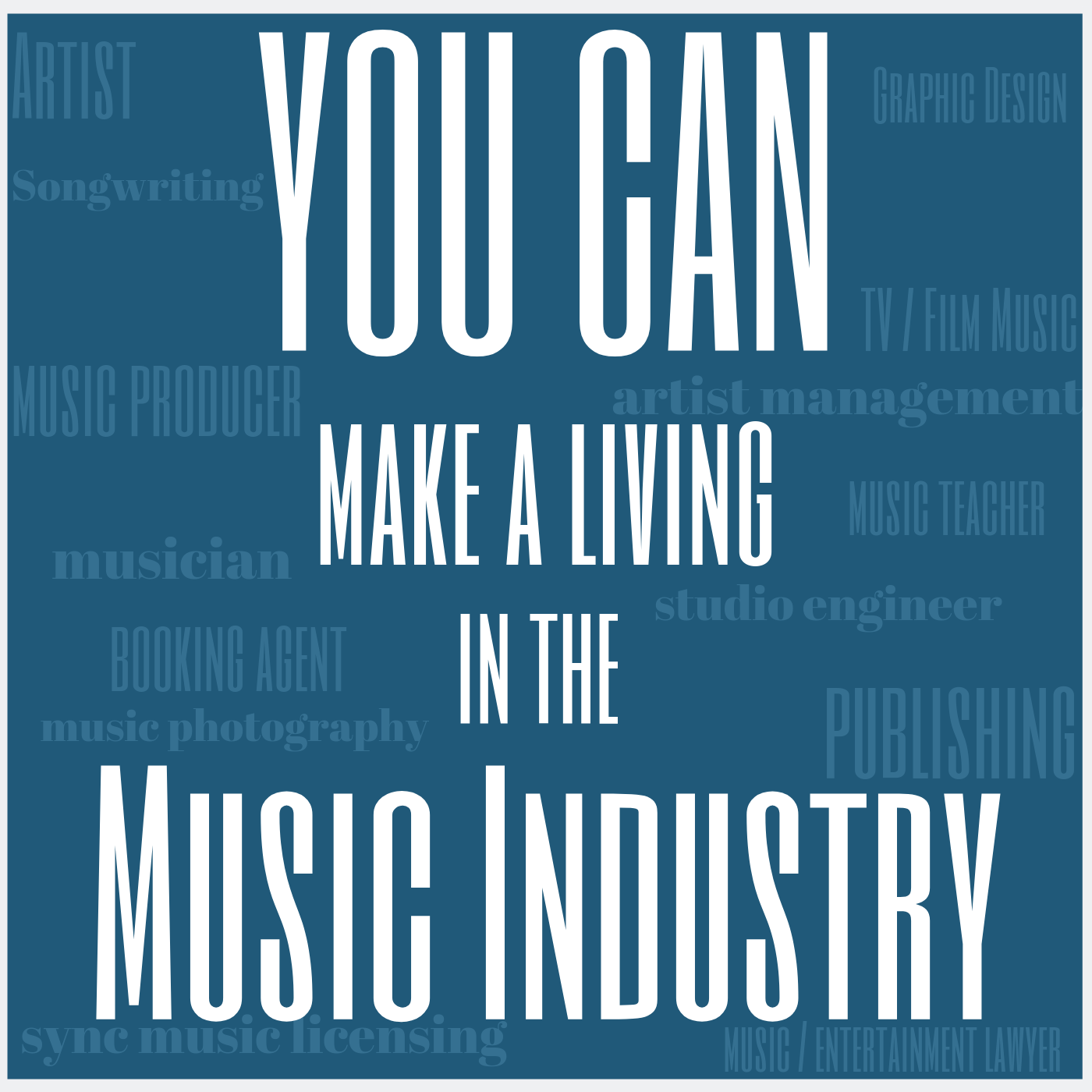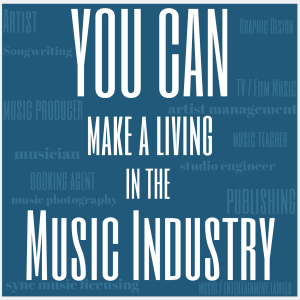

22.7K
Downloads
78
Episodes
Did you know that YOU CAN make a living in the music industry? Celebrities, working class musicians and people just like you who work behind the scenes in all areas of the music business will share their stories, encourage you and give you tools and how-to examples of the ways YOU CAN make a living doing what you love in the music industry.
Episodes

Monday Apr 13, 2020
Episode 24: Wes Cole - Write What Is Authentic To You
Monday Apr 13, 2020
Monday Apr 13, 2020

This week I am talking with Wes Cole who works for sync licensing agency Brewhouse Music in L.A. where he helps musicians by partnering with them and getting their music placed and heard on tv/film projects and commercial ads. We are discussing what it takes to work for sync licensing agencies and custom music houses and also what artists need to do in order to pitch their music successfully to agencies for sync placement. Plus, metadata, metadata, metadata.
Show Notes:
Sponsors: Edenbrooke Productions - We offer consulting services and are offering listeners a 1-hour introductory special. To request more info on consulting services, email Marty at contact@johnmartinkeith.com.
Talking points:
*I went to California State University Northridge for the music industry program.
*I had a business law class and ended up getting an internship because the substitute teacher was a rep for a sync company called Position Music.
*I learned about metadata, metadata, metadata.
*I learned how to take a song from just the artistic view and make it commercially viable.
*The more chances you get to do internships the more chances you have of growing.
*Metadata is the most essential aspect of sync music because you are tagging the song with information like: artist, genre, mood, contact info, keywords, etc.
*Have the ear for what makes a track syncable.
*When a song sounds like it was written for sync, that can actually hurt you. You want it to be an authentic artist piece that incorporates the elements that work for sync (stomps, claps, call and response vocals, etc).
*Remain persistent.
*I moved on to intern at Human Worldwide which focused on advertising music.
*Be willing to stay late and do extra work where you build trust so you can move up in a company.
*The machine room is a team of people that work behind the scenes pulling tracks from the catalog and editing them to picture and cleaning them up and cleaning up videos sent in by clients and making sure the voice overs are attached, etc.
*If you want to do something in a company you have to ask for it. You can’t expect them to give you the opportunity.
*I wanted to start writing music for the briefs coming in so I got that opportunity and it started open so many doors for me because I got first hand feedback from their creative team to tell me ways to improve my song and get the right mix and listening to the reference track and using the right tempo, etc.
*Sometimes you get to write to picture and sometimes you have to make it up in your head so you have to work off a reference.
*I got hired at Massive Music which is an international music house.
*I learned how to do business development with them which is important to know as as freelance composer you don’t have a sales rep working for you. This teaches you how to interact with agencies, copywriter, art directors, etc.
*There is a certain etiquette to interacting with these people.
*When trying to reach out to people you want to license your music, be direct. Say who you are, what you’re doing a give a downloadable link to your music.
*I will know quickly whether or not we will be able to work together.
*Be short and sweet, but have enough intrigue to catch someone’s attention.
*Only reach out when you have music that fits what that person/company is working on.
*If you can, add a life antidote that connects with what you saw on the spot that company worked on and how it impacted you or how you enjoy some aspect of the the spot. That personal connection can be huge.
*Brands have a certain sound.
*Tape delay is one of the most essential tools in sprucing up your sound.
*Make songs that are not too busy so they don’t distract from what’s on the screen.
*I currently work for Brewhouse Music as the Producer focusing on business development, focusing on brands and creatives, while managing our catalog and signing artists and making sure everything gets done on time, etc.
*We are always being asked for music that sounds like hip hop, vintage sounding beats, holiday music and women empowerment.
*We get asked for custom music vs. artist music about 50/50.
*There are huge benefits to have unreleased music that you can put out once it gets placed so they the client can “break” the artist.
*But, if you’re trying to build a following and be out touring etc, I wouldn’t wait because it can take a while for songs to get placed.
*I’m looking for artists that have top quality production value.
*Submit the absolute best quality music.
*Ad music is very specific, not too many genres.
*When creating custom music we use our in house team and outside artists.
*When writing custom music you get paid a demo fee of around $300.
*A sting may pay a demo of around $150.
*If you win the spot, commercial usage pays from around $3000-10,000 for digital online use, not broadcast use. Broadcast can grow exponentially depending on usage.
*If you want to be an artist pitching music for sync, don’t base your music off what you think is going to be syncable. Always write what comes natural to you, then figure out how to add syncable elements that will help boost its commercial appeal.
*Write what is authentic to you because we’ll know whether its something you wrote because you thought it would sound good in a commercial. That’s not going to do as well as an authentic piece which is what the agencies are looking for.
Write as many songs as possible in your own vein and produce them as well as you possibly can and take a chance and throw it out there and see what happen. You would be surprised at the opportunities that can come.
*If you want to work for a sync licensing agency, start taking as many opportunities as possible whether interning, reaching out to sync houses in your area and seeing if you can shadow someone or getting a phone call with someone so they know your name and you can show you interest. It never hurts to ask to see if they are looking for someone to help out.
*You may have to do a lot for a little to get in the door.
*Be willing to put in extra hours.
*Network you head off.
Weslee Cole is an independent artist/producer from Simi Valley, CA.
Having worked within the Music Industry in several fields such as composition, sync licensing, and live events he holds a wide understanding of the business and how it works.
Wes currently deals with artists, composers, and clients at BrewHouse Music a custom, sync licensing company located in Los Feliz. (@brewhousemusic)
His goal is to help musicians reach the next big step in their careers through partnering with them and getting their music placed and heard.
No comments yet. Be the first to say something!